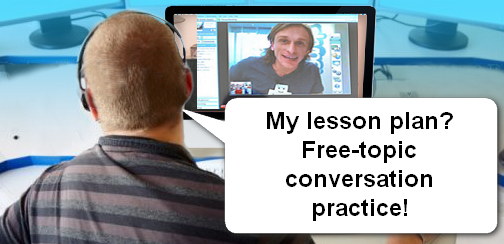Skype Lessons or Language Exchange: That is the Question
Language learning via exchange: the downside of it
It’s hard to overestimate the importance of communication with a native speaker when you’re learning a foreign language. It sounds so exciting: talking to someone from another side of the globe, the carrier of a different culture, virtually someone from another planet.
When you register on one of the language exchange websites, you might be thinking “This person will become my good friend. I will teach them my mother tongue and learn their language. We will speak a few times a week and tell each other news and stories from our lives, speak about our cultures, exchange postcards and maybe visit each other one day”.
If this ever worked for you, I think you’re lucky. It never worked for me. The first conversation was very live and engaging, and then things started to go downhill. Skype meetings became more rare, and conversation subjects started to dry out. Everyone had their own lives with a tight schedule where there was no place for an overseas friend. So, the friendship ended.
Online private tutor as your stimulus
Learning languages is like working out. To maintain a certain level, you need constant training. Otherwise you just get rusty and lose shape. Some people prefer working out on their own (or with a friend), others like to get an instructor or go to a fitness club.
I don’t know the exact statistics, but I have the feeling that the level of commitment to exercise is higher with those who work with an instructor.
Your language instructor has undoubted advantages over your language exchange partner:
| Native Language Instructor | Native Language Exchange Partner |
High level of commitment due to the financial factor. You won’t skip lessons because you pay for them, and your tutor will be thorough about the preparation for the lessons because they get paid | No commitment: the meetings can be cancelled at any time. |
Most efficient use of time. A teacher has a plan for each lesson, so you can be sure the words will sink in. | Time can be wasted on awkward pauses and meaningless conversations that add nothing to your language proficiency. |
Native teachers usually have the best pronunciation. Of course, the main goal of listening practice is to be able to understand natives at their normal speed, but at the initial stage it is vital that the words are pronounced clearly and slowly with a standard accent, and professional teachers are trained to do that. | You can be “lucky” and get a partner with a non-standard accent or speech defects. It might be okay if you’re already quite proficient in the language, but it may completely throw you off the right course at the beginning. Once you’ve learned incorrect pronunciation, it’s very difficult to mend. |
| If you have an analytical mind, you will probably want to know what each word in a phrase means and why it is like this. Though a lot of times it’s just ‘because’, still a teacher has more answers than your language exchange partner. | |
| Finally, your teacher’s proficiency in English can be quite useful at the first stage of learning. | |
Why students can be disappointed at online language classes
The problem with many Skype teachers today is that they think it’s language exchange. They want to get paid for it, but they don’t want to put their time and effort in lesson preparation.
I remember my first and last French lesson on Skype. I went to a popular platform for online tutors and straight to the category of “professional teachers”. This status was given to them by the site administration to differentiate them from “community tutors” (native speakers who mostly provide conversation practice and are not as “highly-skilled” in language teaching as the professionals).
Well, to be honest, the tutor I chose fitted more with the category of “community tutors”. The initial getting-to-know-each-other conversation was fine. I told him about myself in French, and he mildly corrected my mistakes. But then he asked if I had anything in mind for our lesson. He didn’t have a plan… and the teacher should always (!!!) have a plan, especially if he claims to be a professional. Yes, students often have their own agenda, and it is absolutely possible to find out all about it from the email conversation prior to the lesson. However, even in this case it’s the teacher who turns the plan into a lesson. It’s the teacher who finds the necessary material, who organizes it properly and creates exercises.
Anyway, after a minute of thinking and searching for something to engage me with, my tutor put on a 5-minute long video and started eating chips… When my Internet crashed, I didn’t even want to call him back.
Don’t waste your time and money: ask your online tutor about their program
My point is if you ever want to spend your money on an online tutor, be sure you’re not buying language exchange that you can get for free. Ask the teacher about their program; ask what you will learn after 5, 10, 20 lessons.
I think Skype lessons today are the most effective tool of language learning that you can find without leaving your home. You’re getting a native speaker as your teacher; you’re getting a study program; you’re getting consistency, discipline and commitment, and that means your language will never get rusty. What is the most surprising, you’ll be getting an overseas friend you couldn’t get out of language exchange.
Was this article useful? What do YOU think about Skype lessons with a tutor and language exchange? I’d be happy to learn about your experience! Please write your comment below.








